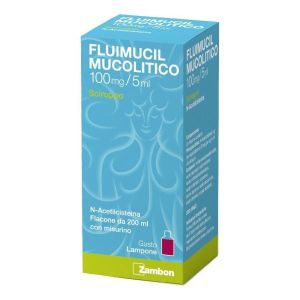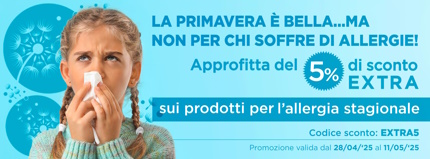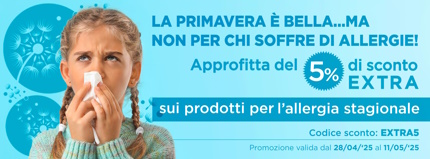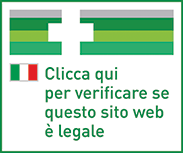Ship in Europe, Find out rates!
Fluimucil Mucolytic Syrup Bottle 200 ml

- box Delivery in Italy in 24/48 and free returns
- star3.000+ positive reviews
- dropboxOver 60,000 products in the catalog
Syrup based on N-acetylcysteine.
Therapeutic indications
Fluimucil is used in the treatment of respiratory diseases characterized by thick and viscous hypersecretion.
Dosage and Posology
The drug should be taken according to the following doses and methods:
- Adults: 10 ml of syrup (1 scoop), equal to 200 mg of N-acetylcysteine, 2-3 times a day.
- Children over 2 years: ½ measuring spoon of syrup (5 ml), equal to 100 mg of N-acetylcysteine, 2 to 4 times a day according to age.
The duration of therapy is from 5 to 10 days in the acute forms and in the chronic forms it will be continued, in the opinion of the doctor, for periods of a few months. Shake before using. Once opened, the syrup is valid for 15 days.
Overdose
No cases of overdose have been reported with respect to oral administration of N-acetylcysteine. Healthy volunteers, who for three months took a daily dose of N-acetylcysteine equal to 11.6 g, did not show any serious adverse reactions. Doses up to 500 mg NAC / kg body weight, administered orally, were tolerated without any symptoms of intoxication. Symptoms Overdose can cause gastrointestinal symptoms such as nausea, vomiting and diarrhea. Treatment There are no specific antidotic treatments; overdose therapy is based on symptomatic treatment
Contraindications
- Hypersensitivity to the active substance or to any of the excipients and other closely related substances from a chemical point of view.
- The drug is contraindicated in children under 2 years of age.
- Generally contraindicated in pregnancy and breastfeeding
Side effects
Below is a table relating to the frequency of adverse reactions that occurred after taking N-acetylcysteine by mouth:
- Disorders of the immune system
- Common: hypersensitivity
- Very rare: Anaphylactic shock, anaphylactic / anaphylactoid reaction
- Nervous system disorders
- Common: Headache
- Ear and labyrinth disorders
- Common: Tinnitus
- Cardiac pathologies
- Common: Tachycardia
- Vascular pathologies
- Very rare: Hemorrhage
- Respiratory, thoracic and mediastinal disorders:
- Rare: Bronchospasm, dyspnoea
- Not known: Bronchial obstruction
- Gastrointestinal disorders
- Uncommon: Vomiting, diarrhea, stomatitis, abdominal pain, nausea
- Rare: Dyspepsia
- Skin and subcutaneous tissue disorders
- Uncommon: Urticaria, rash, angioedema, pruritus
- General disorders and administration site conditions
- Uncommon: Pyrexia
- Very rare: Edema of the face
- Diagnostic tests
- Uncommon: Reduced blood pressure
In very rare cases, severe skin reactions have occurred in temporal connection with the intake of N-acetylcysteine, such as Stevens-Johnson syndrome and Lyell syndrome. Although in most cases at least one other suspected drug more likely involved in the genesis of the aforementioned mucocutaneous syndromes has been identified, in case of mucocutaneous alterations it is advisable to consult your doctor and the intake of N-acetylcysteine must be stopped immediately. Some studies have confirmed a reduction in platelet aggregation when taking N-acetylcysteine. The clinical significance of these findings has not yet been defined.
Pregnancy and breastfeeding
Even if the teratological studies conducted with Fluimucil Mucolytic on animals did not show any teratogenic effect, however, as for other drugs, its administration during pregnancy and during the lactation period, should be carried out only in case of actual need under the direct doctor's check.
Special warnings
Patients with bronchial asthma must be closely monitored during therapy, if bronchospasm occurs, the treatment must be stopped immediately. Mucolytics can induce bronchial obstruction in children less than 2 years of age. In fact, the drainage capacity of the bronchial mucus is limited in this age group, due to the physiological characteristics of the respiratory tract. They should therefore not be used in children under 2 years of age.
The use of the medicinal product in patients with peptic ulcer or with a history of peptic ulcer requires particular attention, especially in the case of concomitant use of other drugs with a known gastric-damaging effect. In the case of diabetic subjects or those who follow low-calorie diets, it should be borne in mind that the syrup preparation contains sugar. In these cases it is possible to use the sugar-free syrup package. The possible presence of a sulphurous odor does not indicate alteration of the preparation but is typical of the active ingredient contained therein. The administration of N-acetylcysteine, especially at the beginning of the treatment, can thin the bronchial secretions and at the same time increase their volume. If the patient is unable to expectorate effectively, postural drainage and bronchoaspiration should be used to avoid secretion retention.
The syrup contains parahydroxybenzoates which can cause delayed allergic reactions and, more rarely, immediate reactions with bronchospasm and urticaria. The buccal tablets and sugar-free granules for oral solution contain sorbitol therefore patients with rare hereditary problems of fructose intolerance should not take this medicine. The buccal tablets and granules for oral solution without sugar contain a source of phenylalanine which may be harmful in patients with phenylketonuria. The 100 mg and 200 mg granules for oral solution contain sunset yellow (E110) which can cause allergic reactions. The granules for oral solution contains sucrose therefore patients with rare hereditary problems of fructose intolerance, glucose-galactose malabsorption or sucrase isomaltase insufficiency should not take this medicine. 200 mg granules for oral solution contains 2.2 g of sucrose per sachet while the 100 mg granules for oral solution contains 4.3 g of sucrose per sachet so it should be taken into consideration in patients with diabetes mellitus. The tablets, the 150 ml syrup and the 200 ml syrup contain respectively 26.9, 16.6 and 17.3 mg of sodium per dose to be taken into account in the case of patients with reduced kidney function or who follow a low content diet. sodium.
Expiration and retention
Check the expiration date indicated on the package. The expiry date indicated on the package refers to the product in intact packaging, correctly stored. Store at a temperature not exceeding 30 ° C.
Warning : do not use the medicine after the expiry date indicated on the package.
Composition
One bottle of Fluimucil Syrup contains:
Active principle
N-acetylcysteine g 4,000
Excipients
Methyl parahydroxybenzoate, sodium benzoate, sodium edetate, sodium carboxymethylcellulose, sodium cyclamate, sucralose, raspberry flavor, sodium saccharinate, sodium hydroxide, purified water.


